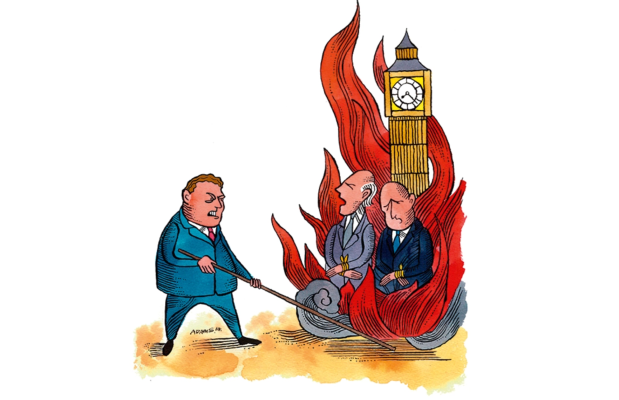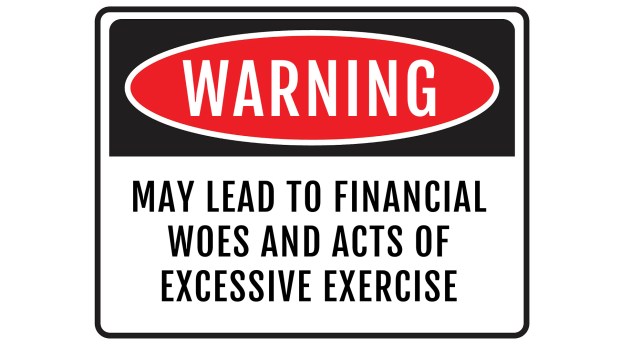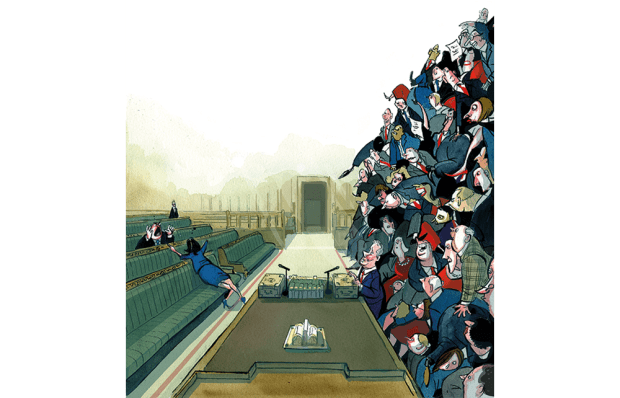Divided we stand
Sir: I was pleased to see that Jenny McCartney picked up on the recent poll from the Irish Times which took a lot of air out of the Irish Unity hot air balloon (‘A bridge too far’, 10 December).
British citizens in Northern Ireland have been told for years that a united Ireland is inevitable and indeed is just around the corner. I am now 52 years old and all throughout my childhood (which coincided with the euphemistically titled ‘Troubles’) sympathetic commentators and republican politicians said we should all prepare for such a time. By 2016 we would be in an all-Ireland state to coincide with the centenary of the violent Easter Rising. That didn’t happen. Now we are told by Irish republican lobby groups that it is coming in a decade. It’s not. The Irish Times poll confirmed that, with only 26 per cent of the Northern Irish respondents in favour of leaving the UK.
This latest poll doesn’t mean that those of us who cherish the United Kingdom should sit back and do nothing. Far from it. Those who seek to destroy the United Kingdom will take recent setbacks, whether from polls or from the Supreme Court, as evidence that they need to work harder to make their destructive vision happen.
We should not engage in the narrative of inevitability, whether it is from separatists in Scotland or Northern Ireland, but should instead focus on why the UK matters to all of us who live here for a myriad of reasons, regardless of where we live – England, Scotland, Wales or Northern Ireland.
Arlene, Baroness Foster of Aghadrumsee
House of Lords, London SW1
Holy relic
Sir: Rather than an ‘increasingly godless Britain’ (‘Sea of faith’, 3 December), British society is now three-dimensional so far as religion is concerned. There is not only the historic Christian tradition and culture, with increasing numbers who neither believe its theology nor belong to its institutions, but an increasing influence of non-religious beliefs alongside religious pluralism. The question to consider is how to respond to this changing religious landscape and help all faith communities feel part of an ongoing national story. The direction was articulated by the Supreme Governor of the Church of England in 2012, when HM Queen Elizabeth II said that the Church’s ‘role is not to defend Anglicanism to the exclusion of other religions. Instead, the Church has a duty to protect the free practice of all faiths in this country. It certainly provides an identity and spiritual dimension for its own many adherents. But also, gently and assuredly, the Church of England has created an environment for other faith communities and indeed people of no faith to live freely’.
In today’s society, the inevitable question for all the British who identify with a religion, not just Christians, is how to be true to their own faith and identity. This is by no means a new question but requires different answers. The Queen’s response was one way and I hope the King’s coronation will point in the same direction.
Dr Edward Kessler
Founder and president, The Woolf Institute
Cambridge
Far from godless
Sir: While the census data on faith demography in England and Wales shows a decline in the proportion of people identifying as Christian by more than 13 per cent, the results also demonstrated that well over half of the UK still identify with a faith (56.9 per cent to be precise). Several of the minority religious communities, such as the Muslim, Hindu, Sikh and Jewish populations, increased over the past ten years. The ‘religious figure’ may well be an underestimate, since the 37.2 per cent who answered ‘no religion’ may include some who do not subscribe to organised religion but still believe in a God or higher being.
The UK remains a role-model country for faith diversity. It remains a magnet for tourists, many of whom appreciate its religious mix and tolerance. Some 140 years ago, the German philosopher Friedrich Nietzsche declared ‘God is dead’. Many would have you believe that the latest census analysis supports this. However, the results are much more complex and the picture more nuanced. Religion remains a majority sport in the UK, and a huge part of many people’s identity.
Zaki Cooper
Trustee, Council of Christians and Jews
London SW1
Soft fruit, hard facts
Sir: I have been in the produce industry all my life and have had a close association with citrus for the past 30 years or so. Some would call me a citrus ‘nerd’, so Dot Wordsworth’s item on ‘easy-peelers’ caught my eye (Mind your language, 3 December).
Believe it or not, Dot’s question of easy-peelers has a lot to do with our old EU law-makers. Traditionally, most supermarkets would market their ‘soft citrus’ fruit under three sub-sections: satsumas, clementines and tangerines. However, over the past 20 years new varieties of soft citrus have been introduced. True clementines are generally available in the Northern Hemisphere from October to mid-January. Most of the new varieties have been developed to mature from January until May to cover a gap that was previously filled with poorer-eating, often seeded varieties. However, Brussels decided that as these varieties were hybrids, they could no longer be called clementines, so supermarkets homogenised this citrus category under the title of ‘easy-peelers’.
For me this is a crime. We choose our apples by variety, and we should do the same for these fruit. If you are lucky enough to get a traditional citrus fruit in your Christmas stocking, what will it be? My guess would be any ‘easy-peeler’, once known as a clementine! Really the best citrus fruit is yet to come; I would suggest you look out for nadorcotts in the New Year, obviously hidden once again under the guise of ‘easy-peeler’.
Finally, oranges are not to be confused with soft citrus. A good orange is something to eat with a plate and a knife.
Paul Chuter
Director, Green Star Produce Ltd
Nottingham
Idiot wind
Sir: Matt Ridley’s excellent piece on the shortcomings of onshore wind farms (‘Blown apart’, 3 December) doesn’t mention the noise problems they can cause. There are multiple reliable ways to lessen the noise from all other energy sources: silencers, lagging of pipes, enclosing machinery and insulating buildings. With wind, there is only one mitigation measure: distance from the turbine. It depends on the terrain but most acousticians estimate that a turbine needs to be one or two kilometres from the nearest residential property for noise not to be a problem. Even that may be insufficient, given the distance the low-frequency noise from turbines can travel and the way it can penetrate buildings.
Nuclear is a whole new magnitude quieter and more productive. Typically, the biggest price for onshore wind farms is being paid by isolated, low-income communities in rural areas – the very people least likely to be able to take on the clout and the advertising might of the wind-power industry.
John Stewart
Chair, UK Noise Association
London SW9
The Act of Expulsion
Sir: Tanya Gold’s review of ‘Britain’s Jews: Confidence, Maturity, Anxiety’ (Books, 26 November) opens with the statement that Britain has been the most welcoming of all the European countries in which Jews have lived. She immediately caveats this by reference to Edward I’s expulsion of 1290, a ban which lasted until repealed by Oliver Cromwell.
Edward’s Act of Expulsion did not apply to Scotland, where Jews were never subject to official sanction. A small example perhaps, but it is this sort of casual conflation of England with Britain that causes Unionists to sigh and nationalists to fume. Incidentally, was Rebecca, in Sir Walter Scott’s Ivanhoe (first published in Edinburgh in 1819), the first Jewish heroine in British literature?
Malcolm Wood
Edinburgh
What museums are for
Sir: Problems with British museums go deeper than the parroting of ideologically sound mantras, which is aptly described by Douglas Murray (‘Displays of ignorance’, 3 December). Even worse, curators often know little of their subjects and assume visitors are equally ignorant. This is particularly true of technological museums. Despite substantial engineering heritage in the National Railway Museum, the director holds a degree in countryside management. That institution recently destroyed an authentic and popular engineering workshop full of historic equipment to instal a ‘Wonderlab’ of ‘interactive displays’ at a cost of £5 million. One exhibit is a set of interactive blocks. A surprise to those of us who thought children’s blocks were always interactive!
I recently visited a museum in a historic south-coast port hoping for a detailed display whose exhibits would reflect its past. Instead, there was a skimpy exhibition with minimalist captions giving no sense of the town’s history. Sadly, such insults to the public intelligence are becoming mainstream practice. Museums as education have been replaced by museums as third-rate entertainment. I despair.
Roger Backhouse
York
Whipped into shape
Sir: There is nothing new about a large turnover of Conservative MPs (Politics, 3 December). More than a third of those returned in 1918 departed at the next election in 1922. That meant an intake of 111 among a total of 345 Tory MPs in the next parliament. The new boys responded to their arrival in unfamiliar surroundings by establishing the 1922 Committee, to which all backbenchers gravitated over the years that followed. Its subcommittees met regularly until the 1990s to consider the specific areas of policy assigned to each of them by the whips, who kept a close eye on what they did. The true blue Tory Lord Stamfordham, who was George V’s private secretary, worried that ‘a government with a huge majority would stifle the growth of parliamentary capacity’ and deter ‘young men from coming in’. It was by providing serious policy work for backbench MPs to do – rather than leaving them to agitate in little groups as they do now – that discipline was maintained and the exit of large numbers at subsequent elections curbed. The key factor was the appointment of calm, effective whips, who kept the committees under diligent surveillance and behaved firmly but politely. They are in short supply today.
Alistair Lexden
House of Lords, London SW1
The drugs might work
Sir:It’s true that the healthcare world is still working out how to use psychedelics most effectively – and that there is much regulatory approval that needs to be obtained (‘There’s nothing magic about magic mushrooms’, 19 November). But there is a growing body of research indicating that all manner of ‘disorders’ could be treated through a combination of psychedelic medicine (or MDMA/ketamine) combined with professional support by psychotherapists. The western model can be brilliant at solving serious health problems, but it has utterly failed to provide solutions to so-called psychosomatic and chronic pain issues. That’s why the West is gradually turning towards traditional eastern holistic approaches to healing.
Oliver Radway
London SW10
Equerry query
Sir: Tina Brown (Royal notebook, 10 December) makes the rather distasteful insinuation that the Queen Consort’s ‘lily-white’ equerry shows the monarchy is stuck in the past. I wonder what Nana Kofi Twumasi-Ankrah of the Blues and Royals, equerry to Elizabeth II for three years, would make of that.
Deirdre Wyllie
Dull, Perth and Kinross
The post Letters: The politics of easy-peelers appeared first on The Spectator.
Got something to add? Join the discussion and comment below.
Get 10 issues for just $10
Subscribe to The Spectator Australia today for the next 10 magazine issues, plus full online access, for just $10.
You might disagree with half of it, but you’ll enjoy reading all of it. Try your first month for free, then just $2 a week for the remainder of your first year.














Comments
Don't miss out
Join the conversation with other Spectator Australia readers. Subscribe to leave a comment.
SUBSCRIBEAlready a subscriber? Log in